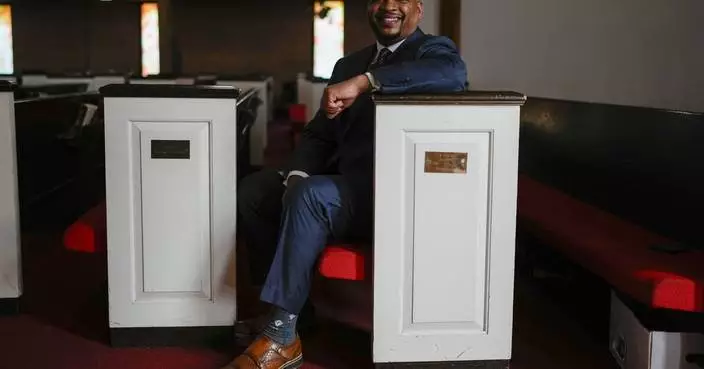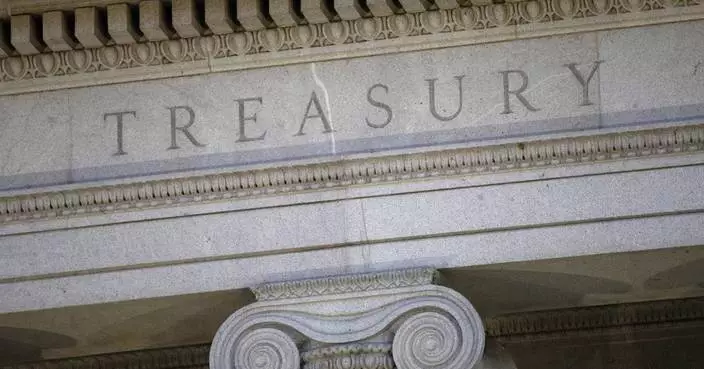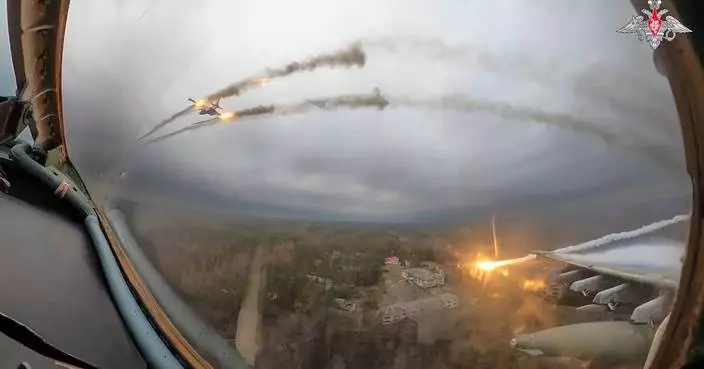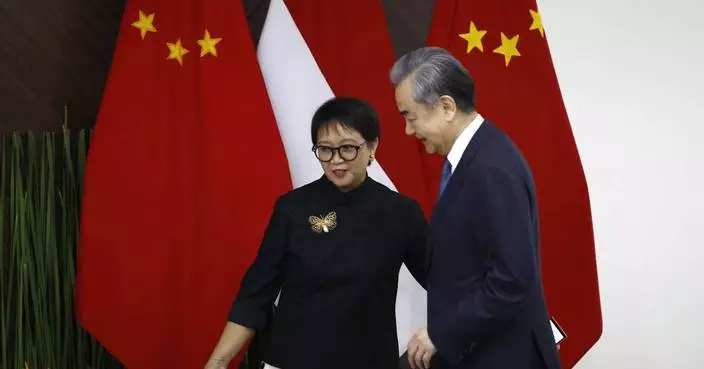The United States and China are pulling back from the brink of a trade war after the world's two biggest economies reported progress in talks aimed at bringing down America's massive trade deficit with Beijing.
"We are putting the trade war on hold," Treasury Secretary Steven Mnuchin said Sunday.
After high-level talks Thursday and Friday in Washington, Beijing agreed in a joint statement with the U.S. to "substantially reduce" America's trade deficit with China, but did not commit to cut the gap by any specific amount. The Trump administration had sought to slash the deficit by $200 billion.
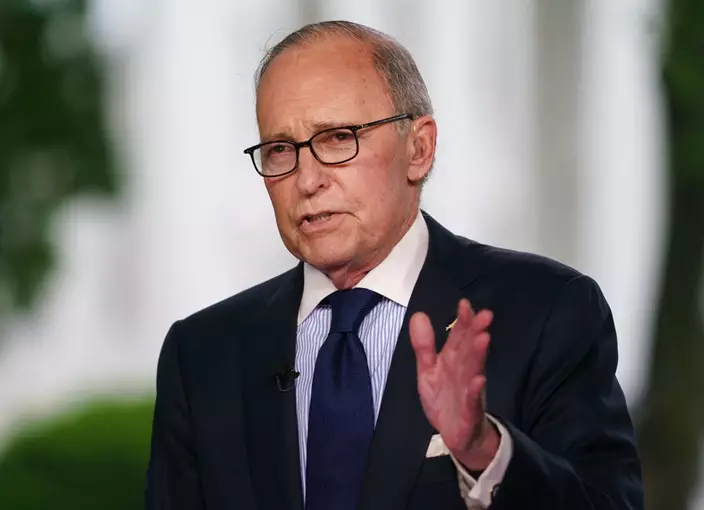
White House chief economic adviser Larry Kudlow speaks during a television interview outside the West Wing of the White House, in Washington, Friday, May 18, 2018. (AP Photo/Carolyn Kaster)
Still, Mnuchin said the two countries had made "meaningful progress" and that the administration has agreed to put on hold proposed tariffs on up to $150 billion in Chinese products. China had promised to retaliate in a move that threatened a tit for tat trade war.
He said they expect to see a big increase — 35 percent to 45 percent this year alone — in U.S. farm sales to China. Mnuchin also forecast a doubling in sales of U.S. energy products to the Chinese market, increasing energy exports by $50 billion to $60 billion in the next three years to five years.
Commerce Secretary Wilbur Ross, who has been part of the U.S. negotiating team, will go to China soon to follow up on last week's discussions, Mnuchin said.
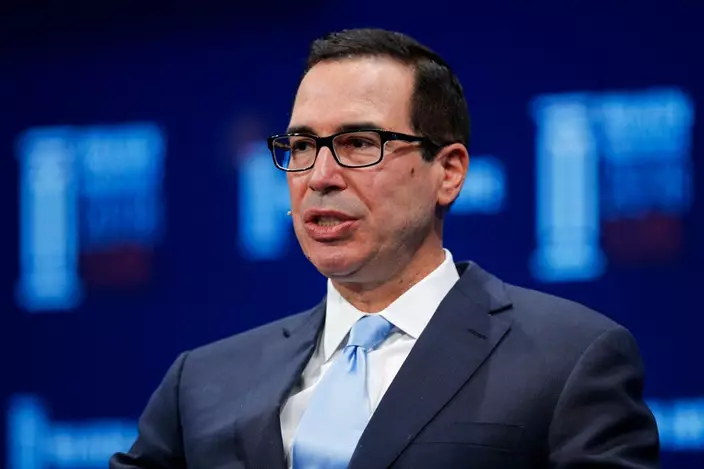
FILE - In this April 30, 2018, file photo, Treasury Secretary Steven Mnuchin speaks during a discussion at the Milken Institute Global Conference, in Beverly Hills, Calif. Mnuchin said Sunday, May 20, that the United States and China are stepping back from a possible trade trade war between the world’s two biggest economies after two days of talks that he said had produced “meaningful progress.” (AP Photo/Jae C. Hong, File)
In Saturday's statement, Beijing committed to "significantly increase" its purchases of American goods and services, saying the increase would "meet the growing consumption needs of the Chinese people and the need for high-quality economic development."
Last year, the U.S. had a record $376 billion deficit with China in the trade of goods; that was the largest by far with any nation.
Trade analysts were not surprised that China refused to agree to a numerical target for cutting the trade gap, but they said the talks probably were more successful in easing trade tensions.
"The Trump administration seems eager to engineer at minimum a temporary peace with China to ensure a smooth run-up to the Kim-Trump summit in June," Cornell University economist Eswar Prasad said, referring to the June 12 meeting scheduled between President Donald Trump and North Korean leader Kim Jong Un.
If there is success in the U.S.-China discussions, analysts suggest it likely would involve the countries' presidents this fall before the November elections.
"Part of the good news for markets: As long as both sides continue to be 'constructively' engaged, imposition of additional tariffs by either side is very unlikely," analysts at investment management firm Evercore ISI said in a research note. "There is no reason for either side — particularly the U.S. — to destroy the process that both sides are building, which is what imposing tariffs would do."
Sen. Lindsey Graham, R-S.C., praised the administration's efforts with China.
"It's smart to engage China on trade abuses, and it would also be smart to get them more involved in trying to help us with North Korea," Graham said.
Trump campaigned in 2016 on a pledge to get tough on China and other U.S. trading partners. He views the U.S. trade deficit with China as evidence that Beijing is engaged in abusive trading practices and has outmaneuvered previous U.S. administrations.
Last August, U.S. Trade Representative Robert Lighthizer began investigating Beijing's strong-arm tactics to challenge U.S. technological dominance. These include outright cybertheft of U.S. companies' trade secrets and China's demands that American corporations hand over technology in exchange for access to the Chinese markets.
Last month, the administration proposed tariffs on $50 billion of Chinese imports to protest the forced technology transfers. Trump later ordered Lighthizer to seek up to an additional $100 billion in Chinese products to tax.
China responded by targeting $50 billion in U.S. products, including soybeans — a shot at Trump supporters in America's heartland. The prospect of an escalating trade war has shaken financial markets and alarmed business leaders.
In a separate controversy, the Commerce Department last month blocked China's ZTE Corp. from importing American components for seven years, accusing the telecommunications company of misleading U.S. regulators after it settled charges last year of violating sanctions against Iran and North Korea.
The ban amounted to a death sentence for ZTE, which relies heavily on U.S. parts, and the company announced that it was halting operations. A week ago, Trump tweeted that he was working with Chinese President Xi Jinping to put ZTE "back in business, fast." Media reports suggested that the U.S. was offering to swap a ZTE rescue for an end to proposed Chinese tariffs on U.S. farm products.
Sen. Mark Warner of Virginia, the top Democrat on the Senate Intelligence Committee, called Trump's intervention in the case "outrageous" and said that using ZTE "as a bargaining chip ... is not in the best interests of our national security."
White House economic adviser Larry Kudlow said there could be "some small changes around the edges" in the sanctions against ZTE. But Kudlow added: "Do not expect ZTE to get off scot-free. It ain't gonna happen."
Mnuchin and Graham appeared on "Fox News Sunday," Warner spoke on CNN's "State of the Union" and Kudlow was interviewed on ABC's "This Week."
HELENA, Mont. (AP) — BNSF Railway attorneys told a Montana jury Friday that the railroad should not be held liable for the lung cancer deaths of two former residents of an asbestos-contaminated Montana town, one of the deadliest sites in the federal Superfund pollution program.
Attorneys for the company say the corporate predecessors of the railroad, owned by Warren Buffett’s Berkshire Hathaway conglomerate, didn't know the vermiculite they hauled over decades from a nearby mine was filled with hazardous microscopic asbestos fibers or that asbestos was dangerous.
BNSF attorney Chad Knight said the railroad could only be held liable if it could have foreseen the health hazards of asbestos based on information available decades ago when the alleged exposures happened.
“In the 50s, 60s and 70s no one in the public suspected there might be health concerns,” Knight said.
The case in federal civil court is the first of numerous lawsuits against the Texas-based railroad corporation to reach trial over its past operations in Libby, Montana. Current and former residents of the small town near the U.S.-Canada border want BNSF held accountable for its alleged role in asbestos exposure that health officials say has killed several hundred people and sickened thousands.
The seven-member jury met briefly Friday and planned to resume deliberations on Monday morning. They were instructed to decide if the railroad was at fault in the deaths and if so, the amount of damages to award to their estates. If the jurors find that the railroad should also face punitive damages, a separate hearing would determine that amount.
Looming over the proceedings is W.R. Grace & Co., a chemical company that operated a mountaintop vermiculite mine 7 miles (11 kilometers) outside of Libby until it was closed 1990. The Maryland-based company played a central role in Libby's tragedy and has paid significant settlements to victims.
U.S. District Court Judge Brian Morris has referred to the the chemical company as “the elephant in the room” in the BNSF trial. He reminded jurors several times that the case was about the railroad's conduct, not W.R. Grace's separate liability.
How much W.R. Grace revealed about the asbestos dangers to Texas-based BNSF and its corporate predecessors has been sharply disputed. The plaintiffs argued that railroad higher-ups were aware, but that workers on the ground in Libby were left out of the loop.
“We're here to make a party that accepts zero responsibility accept an appropriate amount of responsibility,” plaintiffs' attorney Mark Lanier said. “This is the fault of the bigwigs in the corporate office.”
The judge instructed the jury it could only find the railroad negligent based on its actions in the Libby Railyard, not for hauling the vermiculite.
The railroad said it was obliged under law to ship the vermiculite, which was used in insulation and for other commercial purposes. It said W.R. Grace employees had concealed the health hazards from the railroad.
Former railroad workers said during testimony and in depositions that they knew nothing about the risks of asbestos. They said Grace employees were responsible for loading the hopper cars, plugging the holes of any cars leaking vermiculite and occasionally cleaned up material that spilled in the rail yard.
The estates of the two deceased plaintiffs have argued that the W.R. Grace’s actions don’t absolve BNSF of its responsibility for failing to clean up the vermiculite that spilled in the railyard in the heart of the community.
Their attorneys said BNSF should have known about the dangers because Grace put signs on rail cars carrying vermiculite warning of potential health risks. They showed jurors an image of a warning label allegedly attached to rail cars in the late 1970s that advised against inhaling the asbestos dust because it could cause bodily harm.
Family members of Tom Wells and Joyce Walder testified that their lives ended soon after they were diagnosed with mesothelioma. The families said the dust blowing from the rail yard sickened and killed them.
In a March 2020 video of Wells played for jurors and recorded the day before he died, he lay in a home hospital bed, struggling to breathe.
“I’ve been placed in a horrible spot here, and the best chance I see at release — relief for everybody — is to just get it over with,” he said. “It’s just not something I want to try and play hero through because I don’t think that there’s a miracle waiting.”
The Environmental Protection Agency descended on Libby after the 1999 news reports. In 2009 it declared in Libby the nation’s first ever public health emergency under the federal Superfund cleanup program.
The pollution in Libby has been cleaned up, largely at public expense. Yet the long timeframe over which asbestos-related diseases develop means people previously exposed are likely to continue getting sick for years to come, health officials say.
Brown reported from Billings, Montana.
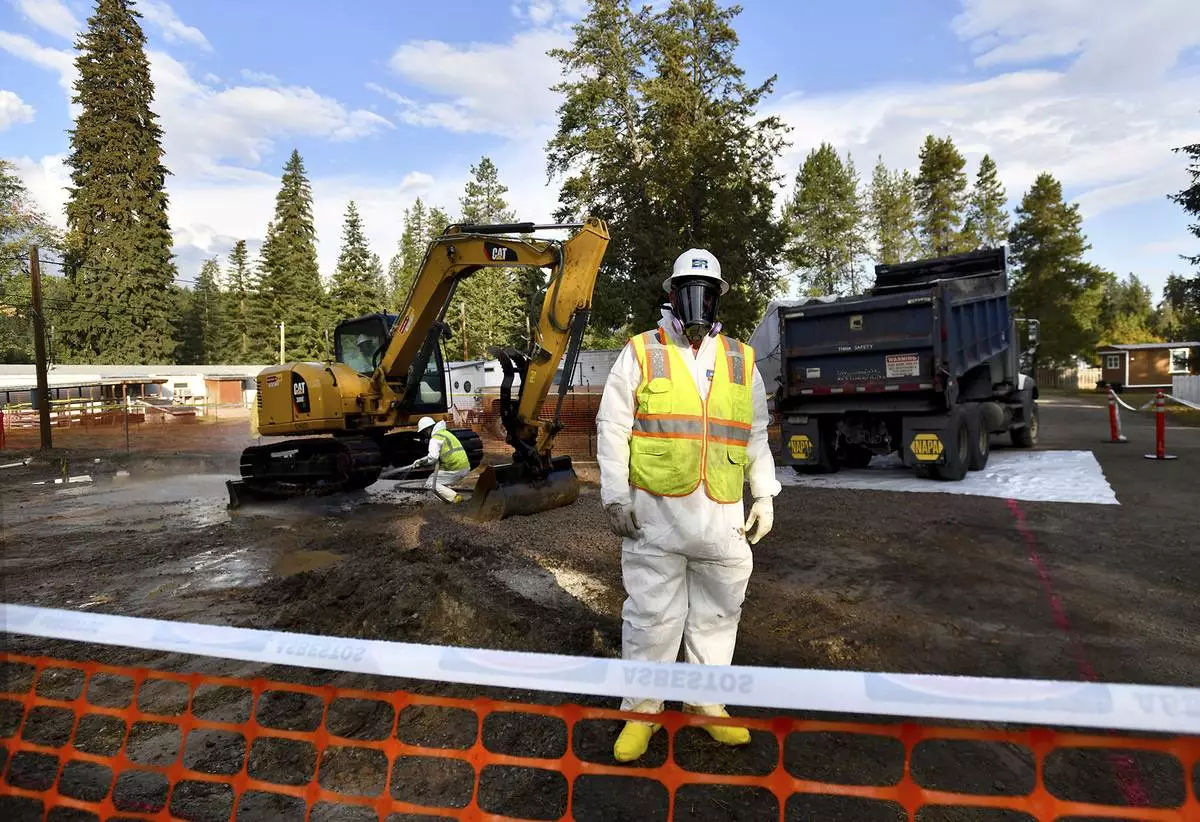
FILE - Environmental cleanup specialists work at one of the last remaining residential asbestos cleanup sites in Libby, Montana, in mid-September. BNSF Railway attorneys are expected to argue before jurors Friday, April 19, 2024, that the railroad should not be held liable for the lung cancer deaths of two former residents of the asbestos-contaminated Montana town, one of the deadliest sites in the federal Superfund pollution program. (Kurt Wilson/The Missoulian via AP, File)

FILE - Dr. Lee Morissette shows an image of lungs damaged by asbestos exposure, at the Center for Asbestos Related Disease, Thursday, April 4, 2024, in Libby, Mont. BNSF Railway attorneys are expected to argue before jurors Friday, April 19, 2024, that the railroad should not be held liable for the lung cancer deaths of two former residents of the asbestos-contaminated Montana town, one of the deadliest sites in the federal Superfund pollution program. (AP Photo/Matthew Brown, File)
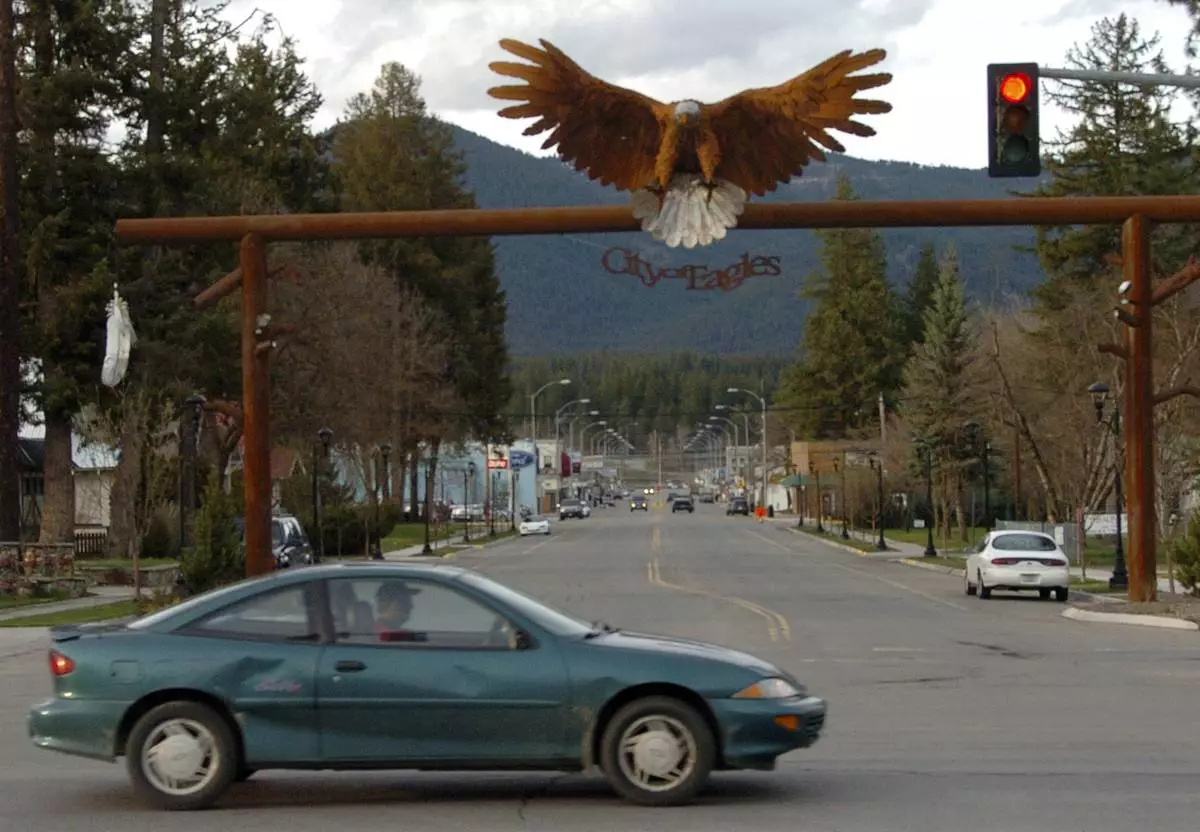
FILE - In this April 27, 2011, file photo, the entrance to downtown Libby, Mont., is seen. BNSF Railway attorneys are expected to argue before jurors Friday, April 19, 2024, that the railroad should not be held liable for the lung cancer deaths of two former residents of the asbestos-contaminated Montana town, one of the deadliest sites in the federal Superfund pollution program. (AP Photo/Matthew Brown, File)








